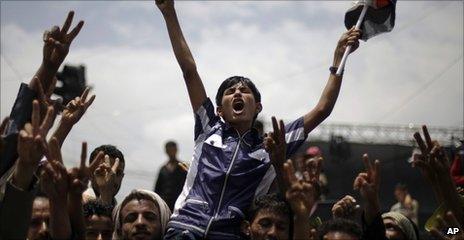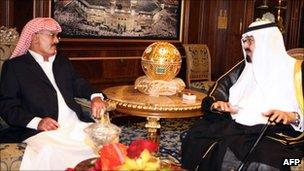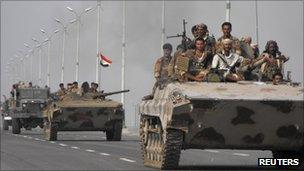Q&A: Yemen crisis
- Published

Yemeni President Ali Abdullah Saleh has signed a deal to transfer power to his vice-president following nine months of protests. The agreement, brokered by Gulf Arab states, ends his rule of more than 30 years. Mr Saleh had been clinging to power after being seriously wounded in an attack on his compound in June. He spent three months recuperating in Saudi Arabia.
What has caused the violence?
Security forces cracked down, often violently, on protests against President Saleh which began in late January. In parallel, a power struggle developed between rival factions loyal to Mr Saleh, Gen Ali Mohsin, and the powerful Ahmar family.
Clashes have largely taken place in the cities of Sanaa, Taiz and Aden, with hundreds of people killed and thousands injured.
Even before this, Yemen was facing several daunting security challenges. In the north, government troops had been battling Houthi rebels belonging to the minority Shia Zaidi sect, though a truce was signed in February 2010.
In the south, they have fought separatists who lost a civil war in 1994. Southern Yemen is also home to al-Qaeda in the Arabian Peninsula (AQAP), considered by some to be the most threatening branch of the international al-Qaeda network. The political chaos in Sanaa has given Islamist militants more freedom to operate.
Is this part of the Arab Spring?
Yes, in as much as the mass protests against President Salah have been inspired by similar movements elsewhere in the Arab world. But the parallel power struggle involves factions that are firmly established within Yemen's elite.
Gen Ali Mohsin al-Ahmar declared his support for the protest movement in March. Butprotesters have complainedthat the factional fighting has compromised what would otherwise be a leaderless, popular revolution in the mold of uprisings in Tunisia and Egypt.
What has been done to find a resolution?

Ali Abdullah Saleh (left) is in Saudi Arabia, and has yet to commit to a transition plan
The six Arab Gulf states that make up the Gulf Co-operation Council (GCC) tried to broker a deal to persuade Mr Saleh to stand down after more than three decades in power. The president appeared to accept the GCC's plan, first presented in March - but then repeatedly failed to sign or act on it.
Vice-President Abedrabbo Mansour Hadi took over as acting president in June after Mr Saleh left for Saudi Arabia. On 12 September, Mr Saleh entrusted him with negotiating a transition deal, but called for further talks before anything was signed.
Mr Saleh finally signed the agreement on 23 November in the presence of Saudi King Abdullah and other senior Saudi officials after flying to Riyadh. In the weeks leading up to the deal, the UN Secretary General's special adviser on Yemen, Jamal Benomar, travelled to Yemen, talking to all sides and helping to negotiate the final details.
What are the terms of the deal?
Vice-President Hadi will form a power-sharing government within 14 days of the signing of the agreement and the opposition coalition will nominate a prime minister.
Mr Hadi will also head a temporary security council and try to negotiate a demilitarisation of the capital, Sanaa, which is currently under the control of rival military factions.
President Saleh must relinquish full control in early February, 90 days after signing the deal, and Mr Hadi will be elected president, as a consensus candidate agreed by all sides. Mr Hadi will then oversee a national dialogue to consider proposals for constitutional reform, such as proportional representation, replacing the presidential system with two chambers of parliament and multi-party federalism. He will also steward talks to restructure the military.
President Saleh and his allies will also have immunity from prosecution, something that has angered protesters.
Why does the rest of the world care?
The West has been increasingly preoccupied by the threat from AQAP, which claimed responsibility for a plot to blow up a US airliner over Detroit in 2009 and for sending bombs on cargo planes bound for the US in 2010.
Western powers have long provided money and training to Yemen's security and intelligence agencies. But they have faced a dilemma: They backed Mr Saleh as the least-bad option and for his proclaimed intention to keep al-Qaeda at bay, yet this position has become increasingly hard to justify as Yemen has become more violent. Mr Saleh, however, has continued to play on fears of the chaos getting even worse if he steps down.
Yemen is in a sensitive position geographically, near to the Gulf's major oil fields and important shipping lanes in the Arabian and Red seas. Arab Gulf states are worried by the possibility that instability could spread, and that refugees could flood over the borders into Saudi Arabia and Oman if the situation in Yemen continues to deteriorate. Yemen is itself home to about 200,000 refugees, almost all of them Somali. The government's conflict with Houthi rebels in the north spilled over the border into Saudi Arabia in 2009; Yemen accused Iran of backing the Shia rebels, raising fears of a proxy conflict.
How bad has the fighting been?

The Yemeni army has been battling militants in the south
There was growing talk of Yemen descending into civil war as the struggle for power became increasingly militarised.A UN report, externalin September noted that authorities seemed to have "lost effective control of parts of the country and within the major cities, where armed opponents appear to have de facto control".
In June, government planes bombed cities said to be under militant control in southern Abyan province, causing tens of thousands of people to flee, and attacks in the area continued for months.
In October, authorities shut the international airport in Sanaa after explosions were reported at an adjacent air force base. There was also fierce fighting between renegade soldiers and government forces in the Hasaba district of Sanaa in October.
What has the impact been on ordinary Yemenis?
Yemen is the Arab world's most impoverished country. Some 40% of the rapidly growing population live on less than $2 (£1.25) a day. About 7.5 million Yemenis - one third of the population - are going hungry,according to Oxfam, external, and Yemen has the most serious water scarcity problems in the world.
The oil reserves Yemen has sold to pay for food imports are rapidly depleting. Unemployment is high, and many adults spend precious funds on the narcotic qat leaf. About 350,000 people have been displaced by conflict in the north.